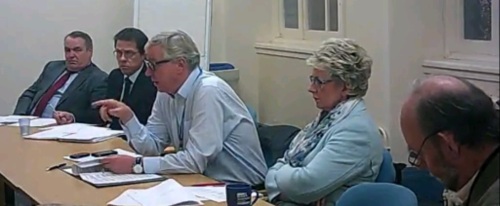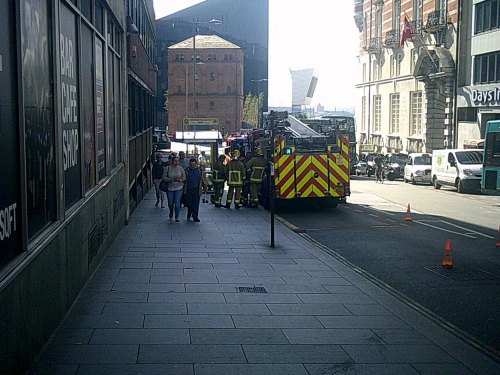Labour councillors argue for increase in range of Wirral Council’s Chief Executives’ salary to between £155,000 and £175,000

Employment and Appointments Panel (Chief Executive) Committee Room 3, Wallasey Town Hall, 24th November 2014 L to R Martin Denny (LGA), David Slatter (Penna PLC), Cllr Jeff Green (Conservative councillor), Cllr Lesley Rennie (Conservative councillor) and Cllr Phil Gilchrist (Lib Dem councillor)
Please accept YouTube cookies to play this video. By accepting you will be accessing content from YouTube, a service provided by an external third party.
If you accept this notice, your choice will be saved and the page will refresh.
Video above is from the Employment and Appointments Panel (Chief Executive) public meeting held on the 24th November 2014 in Committee Room 3, Wallasey Town Hall, Seacombe . This write-up of the public meeting starts at 12:05 in the video above.
Wirral Council’s Employment and Appointments Panel (Chief Executive) met in Committee Room 3, Wallasey Town Hall, Seacombe on Monday afternoon at around 2.30pm. The councillors on the Employment and Appointments Panel (Chief Executive) which had previously been decided by the Employment and Appointments Committee on the 27th October 2014 are:
Cllr Phil Davies (Labour) Chair
Cllr Ann McLachlan (Labour)
Cllr George Davies (Labour)
Cllr Adrian Jones (Labour)
Cllr Jeff Green (Conservative)
Cllr Lesley Rennie (Conservative)
Cllr Phil Gilchrist (Lib Dem)
Continues from Cllr Jeff Green asks if Wirral Council are looking to spend £1,000,000 on their new Chief Executive (over 5 years)?. This is continuing the write-up of a public meeting of the Employment and Appointments Panel (Chief Executive) held on the afternoon of 24th November 2014.
3. Appointment of Chief Executive, Head of Paid Service (including Returning Officer and Electoral Registration Officer)
There was a report and thirteen appendices for this item.
The Chair, Cllr Phil Davies invited Cllr Ann McLachlan to speak. She said, “I think it’s important to recognise where we are in the local government family and what we want to attract here. We want to attract the best in England, so we’ve got to be somewhere in the parameters of being able to say ‘Oh we’re pitching our salary at such an appropriate level, to get the best field of candidates that we possibly can to attract the best in the business’.
I think also it would be fair to say and I’m sure we’ll be doing this, we will be setting, you will Phil within because consultation with the new Chief Executive, you’ll be setting some parameters for them to look at, you know senior management savings across err you know the period of their, their tenure here at Wirral. So and part of the role will also be about saving money, so sometimes you have to invest to save in the longer term and I think also that it’s worth saying that we need to look at comparisons with the rest of the public sector.
It was reported last week that a primary headteacher within an academy was on a salary equivalent to £200,000. The first 150 secondary academies have got heads on over £150,000. You’re talking about a primary head managing a school of two hundred and fifty pupils max, probably about forty staff. There’s no comparison between managing you know a multi-million pound organisation like Wirral!
So I think for those reasons for me, I’ll be saying we need to get this salary in the right range for you know the kind of calibre of the people that we want to work with us.”
Cllr Phil Gilchrist referred to the salary grades. He asked about the salaries of people on the next tier down from Chief Executive and that if they attracted someone who was currently a strategic director in another authority, how much of a salary increase it would be?
Cllr Phil Davies (Chair) replied that they’d have to wait and see what level of candidate they got, but he hoped that they would be attracting not just deputies and strategic directors but actually serving chief executives elsewhere with an “excellent track record” so they could “hit the ground running”. Cllr Phil Gilchrist said he understood.
Cllr Jeff Green said that his parents had told him that “two wrongs don’t make a right”. The other point he wanted to make was that unless they’re going to ask a primary head to run the authority, and there might be one paid £200,000 somewhere around the country, that it wasn’t really a reason for making decisions on the chief executive’s salary. Then again he said, “a primary head might be just what is required!”
Cllr Green continued that his understanding was that a set of proposals were being worked on that were going to save £1.5 million by the current Chief Executive. He said that [Cllr] Ann [McLachlan] had promised that would be delivered in December in terms of Council unless she’d changed her mind and then he revealed “Those savings were already in the works are due to be published in December”. So in terms of some of the points that councillors had been making Cllr Green felt were “extraneous”. He asked them to focus on what would be required, he referred to a saving of £730,000 and referred to a number of issues about the current Chief Executive. He didn’t understand why they’d have to increase it [the Chief Executive’s salary] to £175,000.
Referring to other salaries for Chief Executives in the North West, he said that “to increase to that much seems to be excessive”. He referred to the documents prepared for full Council, how £1.5 million of senior management savings had been identified and how all those things had been delivered off a salary of £130,000. He proposed they seek a Chief Executive on the current salary range of the current Chief Executive of £130,000.
Cllr Phil Davies asked councillors to look at the salaries in appendix 4. He referred to Liverpool City Council’s Chief Executive being paid £197,500, Cheshire West’s £180,000, Cheshire East’s £187,000, Knowsley a “much smaller authority than Wirral” £160,000, St Helens £140,000 and Sefton £152,000. He said “even councils on our doorstep are paying a substantially higher salary than Wirral does.
I think my kind of comments or my reflection on the discussion is, we need to be able to attract the best, but also retain them as well, what we don’t want to do is get somebody here and then because Cheshire West are paying you know a much larger salary, they’ll disappear to Cheshire West in a few years time. So I think we need to just have that in our forefront of our minds as well.”
Cllr Ann McLachlan said, “Completely disingenuous [Cllr] Jeff [Green], because what I was doing was giving a comparison with the public sector that wasn’t a local government chief executive, just to demonstrate that out there the salaries in the public sector in general at that level, you know to get the expertise you want at that level are much more higher than Wirral.
I’m going to ask Chris [Hyams] if she would give us a little bit of background on that £131 or £130 or whatever it is Graham [Burgess]’s in, because how long, what was the previous Chief Executive on? Coz Graham [Burgess] came to us and took his pension, I think he took his pension, .. or has pension arrangements in place or didn’t need to be paid the on costs that we would have to pay.
Well previous chief executives, what kind of salary was he on and how long ago was that? I mean in a sense I think we need to get a bit of a reality check here and get in the real world about what the real costs of salaries at this level are.
So, errm, yeah, I think it’s you know, our salary range here is at the bottom of the tree really. So what’s the history of that and also you know it’s not that two wrongs don’t make a right, it’s not anything like that but what we’re trying to do is demonstrate that here in this Authority we want to get somebody who is going to you know help us in the obviously very clear difficult financial circumstances we’re in, with the financial challenges we’ve got going forward as well and in remodelling and changing this Council. You know, so errm, I’m absolutely of the view that we will have to pay the appropriate level. Thanks Chris.”
Chris Hyams, Head of HR responded by saying, “OK, thank you. The current Chief Executive is paid top of the salary range. As the Deputy Leader’s just intonated, it is in the public domain that he left his last council with a pension which is why we didn’t incur the on costs. So in terms of remuneration, there was an additional salary arrangement through his last job through gaining his pension.
Before that, the salary range that was in place for a previous Chief Executive had his spot salary within that range of £130,000. The range has not been reviewed for a number of years and certainly not reviewed as such or changed previously to this in the time that I’ve been here in the last five years.”
Continues at 4 Labour councillors agree salary for new Wirral Council Chief Executive at between £155,000 and £175,000.
If you click on any of these buttons below, you’ll be doing me a favour by sharing this article with other people. Thanks:
